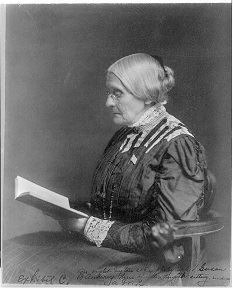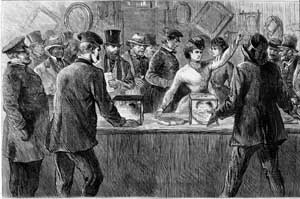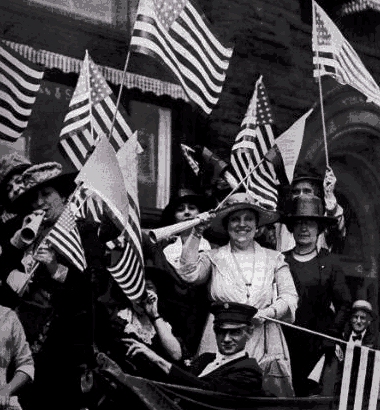 |
| (http://www.shmoop.com/womens-movements/photo-susan ()) |
"Men, their rights, and nothing more; women, their rights, and nothing less" (Susan B. Anthony "Susan B. Anthony Quotes"). This quote from Susan B. Anthony shows how she represented herself as an activist. Anthony was born in a Quaker family, so right from the start she was born into the activist life ("Susan B. Anthony" UXL Biographies). Later on in her life she became a well known suffragist, abolitionist, and author ("Susan B. Anthony" Biography.com). Anthony accomplished numerous achievements, like in 1869 she and others formed the National Woman Suffrage Association. After collecting petitions, she passed the Married Women's Property Act in 1860 (Dubois). Sadly in 1906 Anthony died in her house ("Susan B. Anthony House"). During the time Anthony was alive people were against the thought of equality. Knowing that these thoughts can put her in danger, Anthony still fought through the risks to try to accomplish equality. Anthony's willingness to fight through the dangers of a disapproving country brought out her brave and determined characteristics reflects her heroic actions.
 |
| A sketch of women trying to vote in 1872 (http://law2.umkc.edu/faculty/PROJECTS/FTRIALS/anth ()) |
Susan B. Anthony demonstrated bravery by letting her beliefs drag her into dangerous situations. Anthony decided to take a risk to fight for what she believed in: "Accordingly, in November, 1872, Anthony took the most famous act of her life: she convinced Rochester, New York election officials to allow her to submit her ballot for President. For this she was found guilty of illegal voting in U.S. District Court, and fined $100, which she refused to pay" (Dubois). Susan B. Anthony's illegal act of bravery demonstrated her willingness to fight. She wasn't afraid of getting fined, but rather afraid of her voice getting put to the side. This shows that she finds women being able to vote more important than getting fined. During her time as an activist, Anthony had enough of the sexism at work. Deciding that speaking out was the best option, she protested: "Anthony's weekly salary was equal to one-fifth of that received by her male colleagues. When she protested this inequality, she lost her job" ("Susan B. Anthony" UXL Biographies). Susan B. Anthony losing her job to protest against unfairness shows how willing she is to sacrifice for her beliefs and rights. Earlier in her career, Anthony fought against slavery. Since many Americans were pro-slavery, this resulted in her getting attacked, "In 1856 Anthony became an agent for the American Anti-Slavery Society, arranging meetings, making speeches, putting up posters, and distributing leaflets. She encountered hostile mobs, armed threats, and rocks thrown at her" ("Susan B. Anthony House"). Susan B. Anthony knew her life was going to be in danger because of the amount of pro-slavery in the United States. She still pushed through the dangers of being an abolitionist and proved to others how strong she is. In conclusion, Anthony risked her life for the rights of others, and proved her bravery.
Anthony's determined mindset is shown in her hard work in fighting for human rights. Whenever she wanted to achieve something, she did it, and made sure it impacted others. One of the first things Susan B. Anthony did for women's rights showed how much effort she puts into her beliefs: "Beginning in 1854, Anthony traveled across New York collecting petitions to the state legislature, which in 1860 passed a comprehensive Married Women's Property Act" (Dubois). Anthony traveled and worked for six years to have the Married Women's Property Act passed. In the years she spent collecting petitions, Anthony did not give up once and continued working to the end to accomplish something for women's rights. Later on in her career, Anthony decided to join a temperance society, but since she is a women, she couldn't voice her thoughts. Not being able to keep quiet Susan B. Anthony decided to take matters in her own hands: "She joined the local temperance society but was denied the chance to speak at a meeting because she was a woman. Unwilling to be silenced, she founded the Daughters of Temperance, the first women's temperance organization" (Benson et al.). Having found the Daughters of Temperance, Anthony showed that her decision of speaking out proved her strength and willingness to fight for the equality of all genders. Continuing on the topic of equality, Anthony tried to find other ways to spread the issue around: "Susan B. Anthony's paper The Revolution, first published in 1868, advocated an eight-hour work day and equal pay for equal work. It promoted a policy of purchasing American-made goods and encouraging immigration to rebuild the South and settle the entire country" ("Susan B. Anthony House"). Anthony efforts not only helped spread the issue of inequality, but also settled the country in. Her persistence in fighting for what she believed in is established in her attempts on trying to find fairness in their country. Susan B. Anthony's efforts that were shown in her actions displayed her determined air, and let her fight for the rights of others.
 |
| Celebrating after women got the right to vote. (http://law2.umkc.edu/faculty/PROJECTS/FTRIALS/anth ()) |
Susan B. Anthony put her life in danger by taking risky action for the rights of people introduced her traits of bravery and determination. Anthony putting her beliefs before her own safety acknowledged her bravery. Additionally, she proved herself to be determined by not stopping in fighting for human rights. These actions made Anthony a memorable hero. Even though Susan B. Anthony had passed away in 1906, she managed to inspire people after her death. Her work led up to women getting the right to vote: "All American adult women finally got the vote with the Nineteenth Amendment, also known as the Susan B. Anthony Amendment, in 1920" ("Susan B. Anthony House"). Fourteen years after her death women got the right to vote, which verified that others tried to keep her legacy going. People were inspired by all the thought she put into her work as a suffragist. I, as a female, also feel inspired by Anthony's work, and without her undertaking the hard labor of fighting for human rights, women probably wouldn't be able to vote. Anthony proved herself as nothing more than a hero, but nothing less than a women.
Work Cited
Benson, Sonia, et al. "Anthony, Susan B." UXL Encyclopedia of U.S. History, vol. 1, UXL, 2009,
pp. 77-79. Student Resources in Context, link.galegroup.com/apps/doc/CX3048900034/SUIC?u=powa9245&xid=89c166e8. Accessed 19 Jan. 2017
Dubois, Ellen Carol. "Susan B. Anthony." Encyclopedia of the American Constitution, Gale,
2000. Biography in Context, link.galegroup.com/apps/doc/K3425000108/BIC1?u=powa9245&xid=52b75fb1. Accessed 19 Jan. 2017.
"Susan B. Anthony." Biography.com, A&E Networks Television, 12 Mar. 2015,
www.biography.com/people/susan-b-anthony-194905#related-video-gallery.
"Susan B. Anthony." UXL Biographies, UXL, 2011. Student Resources in Context,
link.galegroup.com/apps/doc/EJ2108100088/SUIC?u=powa9245&xid=76dc7e2b. Accessed 19 Jan. 2017.
"Susan B. Anthony House." Susan B. Anthony House :: Her Story,
susanbanthonyhouse.org/her-story/biography.php.
"Susan B. Anthony Quotes." BrainyQuote, Xplore,
www.brainyquote.com/quotes/quotes/s/susanbant128067.html.Page created on 2/5/2017 12:00:00 AM
Last edited 2/5/2017 12:00:00 AM
